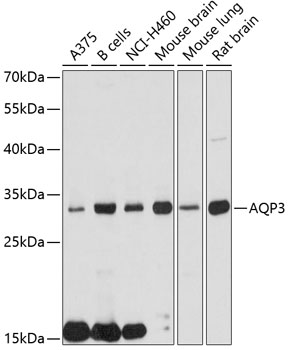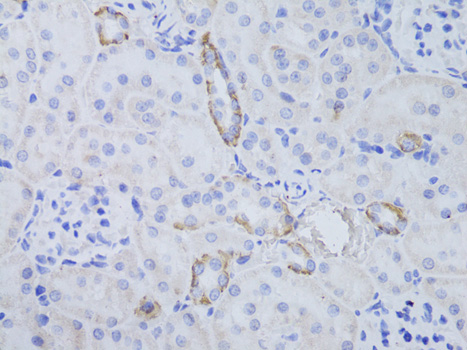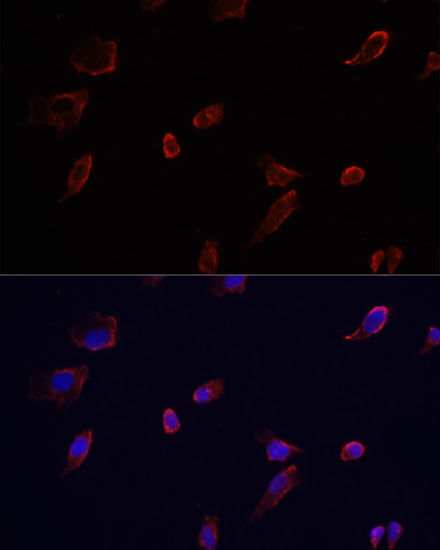-
Product Name
AQP3 Polyclonal Antibody
- Documents
-
Description
Polyclonal antibody to AQP3
-
Tested applications
WB, IHC, IF
-
Species reactivity
Human, Mouse, Rat
-
Alternative names
AQP3 antibody; AQP-3 antibody; GIL antibody; aquaporin-3 antibody
-
Isotype
Rabbit IgG
-
Preparation
Antigen: Recombinant fusion protein containing a sequence corresponding to amino acids 178-292 of human AQP3 (NP_004916.1).
-
Clonality
Polyclonal
-
Formulation
PBS with 0.02% sodium azide, 50% glycerol, pH7.3.
-
Storage instructions
Store at -20℃. Avoid freeze / thaw cycles.
-
Applications
WB 1:500 - 1:2000
IHC 1:50 - 1:200
IF 1:50 - 1:200 -
Validations

Western blot - AQP3 Polyclonal Antibody
Western blot analysis of extracts of various cell lines, using AQP3 antibody at 1:3000 dilution.Secondary antibody: HRP Goat Anti-Rabbit IgG (H+L) at 1:10000 dilution.Lysates/proteins: 25ug per lane.Blocking buffer: 3% nonfat dry milk in TBST.Detection: ECL Basic Kit .Exposure time: 10s.

Immunohistochemistry - AQP3 Polyclonal Antibody
Immunohistochemistry of paraffin-embedded rat kidney using AQP3 antibody at dilution of 1:50 (40x lens).

Immunofluorescence - AQP3 Polyclonal Antibody
Immunofluorescence analysis of HeLa cells using AQP3 antibody at dilution of 1:100. Blue: DAPI for nuclear staining.
-
Background
Water channel required to promote glycerol permeability and water transport across cell membranes. Acts as a glycerol transporter in skin and plays an important role in regulating SC (stratum corneum) and epidermal glycerol content. Involved in skin hydration, wound healing, and tumorigenesis. Provides kidney medullary collecting duct with high permeability to water, thereby permitting water to move in the direction of an osmotic gradient. Slightly permeable to urea and may function as a water and urea exit mechanism in antidiuresis in collecting duct cells. It may play an important role in gastrointestinal tract water transport and in glycerol metabolism (By similarity).
Related Products / Services
Please note: All products are "FOR RESEARCH USE ONLY AND ARE NOT INTENDED FOR DIAGNOSTIC OR THERAPEUTIC USE"
